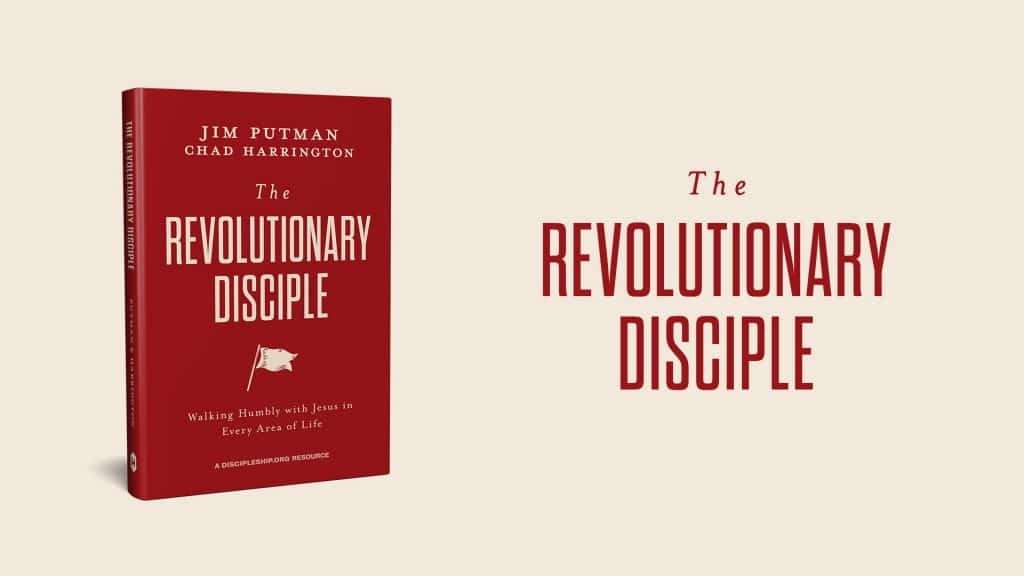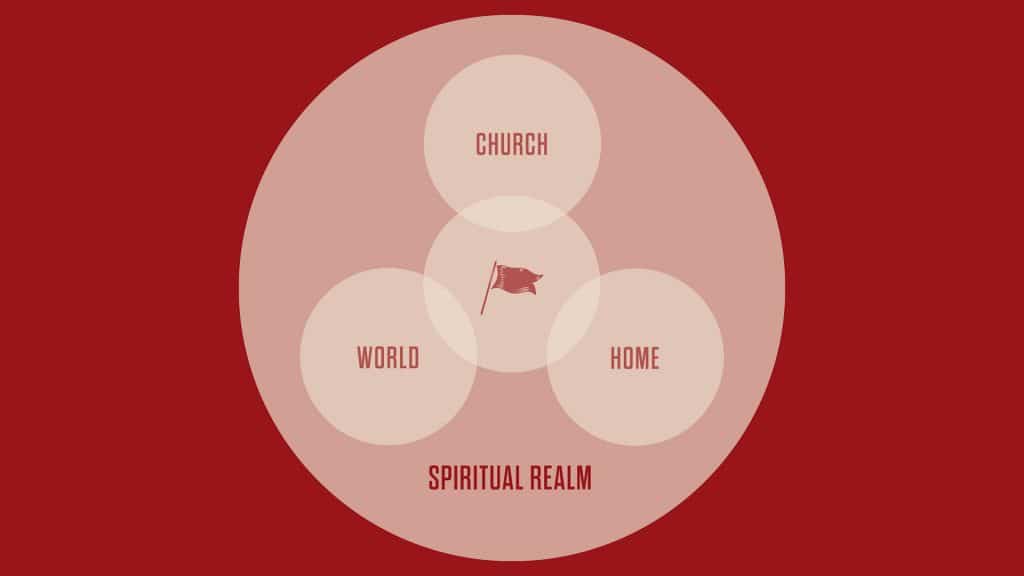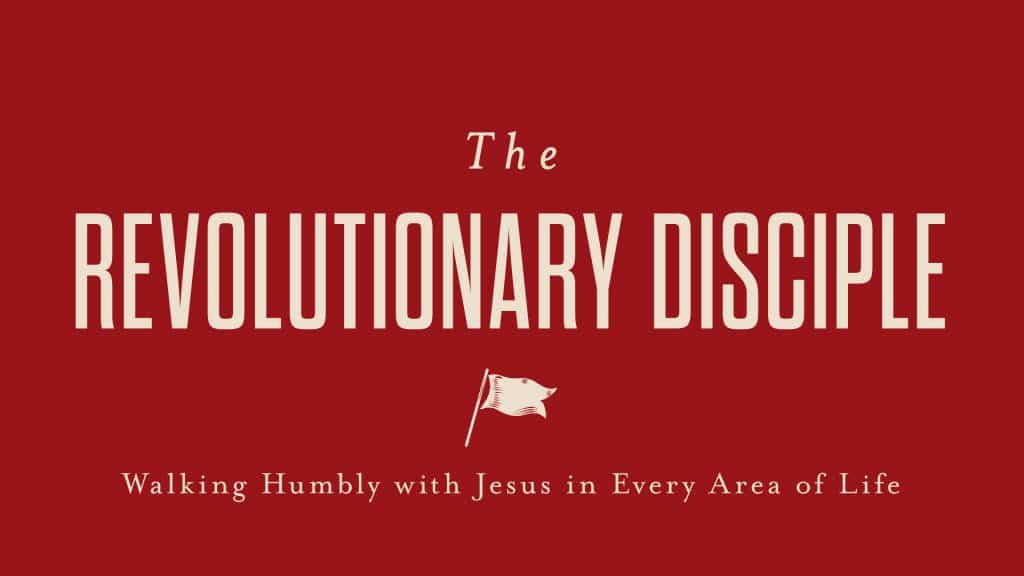The genesis of The Revolutionary Disciple happened when authors Jim Putman and Chad Harrington saw the crushing effect of pride on relational discipleship.
How must disciples of Jesus respond? They suggest learning to walk humbly with Jesus, the first revolutionary.
When I was 24 years old, living in Nashville, Tennessee, and feeling burned out after six years of training for ministry, Jim Putman called my cell phone and invited me to do a youth ministry internship at his church, Real Life Ministries—in Northern Idaho.
I had been training for ministry, and now was a time to engage in it.
A few months later, I set off on the three-day car journey and arrived in Post Falls, Idaho.
And yes, my first meal included potatoes!
I spent the next three months learning the Real Life Ministries model of “relational discipleship.” While I had known Jim through his relationship with my dad, this was my first chance to get to know Jim more personally.
That fall, I saw the inner workings of their church with its 6,000 members as I participated in an adult’s small group and as I led a middle school discipleship group. I learned so much as I watched how they worked as a team.
The church staff invested time in me, spent energy teaching me, and gave me “a place to play,” as they call it. Plus, Jim and his family invited me to family gatherings during those three months.
They treated me like family because in Christ we are family. I felt so loved by them.
I had gone to Idaho to learn relational discipleship, and what I gained from that season helped catapult me into a new way of following Jesus in community!
It was a time of deep refreshing because it gave me hope.
I had been burned out with ministry before the internship started, but afterward, I wanted to engage in ministry again.
When the internship ended in December of 2010, I returned to Nashville, where I’ve now spent the majority of the last decade pursuing my calling to teach and write for and in the Church. I’ve participated in discipleship through nonprofits, church ministries, and discipleship groups at my home church, Harpeth Christian Church, where I now serve as a deacon of the teaching ministry.
My Struggle with Pride
Where do pride and the book I wrote with Jim come in? Well, a little background first:
I didn’t rebel against my parents as a teenager, but I experienced similar conflicts typical of teenagers in my mid-to-late twenties. My dad and I disagreed regularly—and even had tense moments, as I explain in detail in the introduction of The Revolutionary Disciple.
What was the source of our challenges?
As hard as it is to admit …
I was struggling with pride.
My dad’s not perfect, just like anyone else, but looking back on that season, I believe the source of our conflicts came back to a character defect of pride.
I’ll let you read in the book how this all came to a head and how God revealed my pride to me, but suffice to say for now that my dad and I now enjoy a close relationship.
Our Problem with Pride
While I was dealing with my own struggles with pride, Jim Putman was also confronted about his pride by someone close to him—actually by a group of men close to him at his church—the elders at Real Life Ministries.
Jim also shares about his struggle with pride in the introduction of The Revolutionary Disciple. In fact, his pride almost resulted in his quitting as the lead pastor at the church he had helped found many years earlier.
Yet God convicted him, redeemed his situation, and brought him and the group of elders at his church through the conflict even stronger than before. He shares the full story in the book, so I won’t share any more.
By 2018, both Jim and I had been confronted by our problem with pride and made it through a particularly intense battle with it.
Further, we had both begun to experience God’s restoration from our brokenness. That is, we were broken by our pride, and God then led us to take concrete steps toward the humility of Christ.
Our eyes were opened, and we were liberated from the bondage of pride.
Looking up, we then saw clearly just how deep this issue of pride runs in our country—and in our churches.
The Genesis of The Revolutionary Disciple
In 2018, I got another phone call from Jim. This time we weren’t talking about an internship, but about a book.
My dad, funny enough, had commissioned us to write a book together about relationships, and Jim knew exactly what he wanted the theme to be.
So Jim said to me, “There’s only one thing I want to write about right now: pride. It kills discipleship on every level.”
As we kept talking, his words rang loudly in my ears and resonated with my personal journey and what I saw in others:
Pride kills discipleship.
So that year we began writing what is now The Revolutionary Disciple: Walking Humbly with Jesus in Every Area of Life.
The world has seen revolutions—and some are talking about potential future ones too—but Jesus started the only lasting one. Jesus’ revolution was not typical of the world, though. The revolutionary nature of Jesus involved humility and submission, not just power and taking ground.

That gives some of the reason why we named the book as we did.
By the time the book took final shape in 2021, our country had gone through an entire year of the COVID-19 pandemic, so we incorporated the events that started in 2020 into the message of our book.
A Broader Problem with Pride
The events of 2020 revealed what’s been brewing in our country for some time now: power struggles and pride.
Our country became divided about various issues such as masks, vaccines, and even the role of the police—just to name a few.
As the world looks at Christians, it sees our church marquees, our bumper stickers, and our social media posts. But here’s a challenging question:
Do they see the humility of Christ in us?
Unfortunately, most of the time, they do not.
What dumbfounded Jim and I was not that Christians had divided opinions about various issues, but how Christians handled disputes and differences. Churches split and shut down, friendships ended, and even marriages died as a result of these differences.
So as we wrote the book, we asked ourselves:
What is the root cause of these factions and fights among Christians?
This is similar to what James asked first-century disciples: “What causes fights and quarrels among you? Don’t they come from your desires that battle within you?” (James 4:1).
Now, some issues that arose in 2020 are complex, and we’re not claiming there’s always a simple answer.
Yet both Jim and I saw this issue of pride rear its ugly head among disciples in a way we had not seen in our lifetimes.
Then we realized this pride issue that’s dividing people in our country is also destroying discipleship in our churches and beyond.
The Revolutionary Disciple Addresses the Problem of Pride
If pride kills discipleship, then what’s the alternative solution?
Walking humbly with Jesus in every area of life.
Let’s break this answer down into three parts.
1. “Walking humbly”
We use the language of “walking” from Paul’s letter to the Ephesians, where he describes discipleship eight times in terms of “walking” (peripateoœ in Greek):
- Eph. 2:1–2: As for you, you were dead in your transgressions and sins, in which you used to live when you followed the ways of this world and of the ruler of the kingdom of the air, the spirit who is now at work in those who are disobedient.
- Eph. 2:10: For we are God’s workmanship, created in Christ Jesus to do good works, which God prepared in advance for us to do.
- Eph. 4:1: As a prisoner for the Lord, then, I urge you to live a life worthy of the calling you have received.
- Eph. 4:17: So I tell you this, and insist on it in the Lord, that you must no longer live as the Gentiles do, in the futility of their thinking.
- Eph. 5:1–2: Be imitators of God, therefore, as dearly loved children and live a life of love, just as Christ loved us and gave himself up for us as a fragrant offering and sacrifice to God.
- Eph. 5:8: For you were once darkness, but now you are light in the Lord. Live as children of light.
- Eph. 5:15–17: Be very careful, then, how you live—not as unwise but as wise, making the most of every opportunity, because the days are evil. Therefore do not be foolish, but understand what the Lord’s will is.
That’s discipleship in terms of “walking.”
What about walking humbly with Jesus?
2. “With Jesus”
Matthew 11:28–30 provides input into that piece:
“Come to me, all you who are weary and burdened, and I will give you rest. Take my yoke upon you and learn from me, for I am gentle and humble in heart, and you will find rest for your souls. For my yoke is easy and my burden is light.”
This passage says we must:
- Come to Jesus.
- Learn from him.
- He is humble.
The passage implies we learn humility from Jesus by spending time with Jesus—as we work with him.
A “yoke” in Jesus’ day, as we explain in more detail in Chapter 5 of the book, “The Yoke of Christ,” meant physical labor. While Jesus’ work is not burdensome, it’s still work.
The key, though, is the relationship and humility piece of this passage. What Jim has emphasized over and over again in his preaching and teaching—and what we captured in the message of The Revolutionary Disciple—is this important truth:
We learn relationship in relationship.
So we learn how to be humble by spending time around Jesus. He is the greatest example of humility. Our relationship with God is first and foremost.
Yet more down to earth and more to the point, though, especially for those of us walking with Jesus today (instead of in the first century): we learn how to be relationally humble by engaging in relationships with people who model humility for us.
That is, we learn what humility looks like in relationships with humble people.
No one is perfect, but surely we can learn from others who are strong where we’re weak!
3. “In every area of life”
Our goal here, as disciples of Jesus, is to surrender every part of our lives to Christ the king.
This means we must learn to walk humbly in every way. That’s part of what Paul means in Ephesians 4:2: “Be completely humble and gentle.”
The framework Jim and I use for this—walking humbly in every area of life—is:
The Five Spheres of Discipleship
Jim and his team use this phrase to describe all the areas of life.
The five spheres are:
- Abiding in Christ
- The Church
- The Home
- The World
- The Spiritual Realm

What do pride and humility look like in each sphere? Perhaps a better question is, “What do they sound like in each sphere?”
Here’s some of what we’ve observed:
Sphere 1. Abiding in Christ
- Pride in this sphere sounds like, “I don’t need to learn anything else. I’m good.”
- Humility says, “I need you, God.”
Sphere 2. The Church
- Pride in the church sphere sounds like, “All I need is Christ, so I don’t need the church.”
- Humility says, “Christ gave us his church, and he asks us to participate in it through relationships with other disciples.”
Sphere 3. The Home
- Pride at home says, “I’m the leader of this home, so we’re going to do things my way.”
- But humility says, “Let’s process this decision together and listen to one another so we can move forward in unity.”
Sphere 4. The World
- Pride in the world sphere says, “I don’t need to submit to my boss. They’re doing it wrong anyway.”
- Humility says, “God called me to be humble at work, so I’ll come under the leadership of my boss even when I don’t agree with their method.”
Sphere 5. The Spiritual Realm
- Pride in the spiritual realm says, “I’m not susceptible to spiritual attack.”
- Humility says, “I could be attacked at any moment, so I need God’s protection, wisdom, and strength to win spiritual battles. I can’t do it on my own.”
Pride says, “me,” but humility says, “we.”
We tease out these dynamics in the book, sharing personal stories, expounding on biblical precedents, and giving other examples of pride and humility in the five spheres.
So Why Did We Write This Book?
We wrote The Revolutionary Disciple because God changed our lives through the scriptural message of the book.
And we wanted to help people see the problem of pride and how it destroys discipleship at every level.
More importantly, though, we wanted this resource for disciples to provide a scriptural path and plan to help them make progress on their journey of discipleship. For example, we outline in Chapter 4 the “profile of a revolutionary disciple,” which describes the four core practices of a humble disciple.
Then we walk with readers through each sphere as we explain what humility looks like.
So why did we write it? Because:
- We need this message.
- Disciples of Jesus need this message.
- Our churches need this message.
- And the world longs to see the fruit of this message.
Our message is not new but timeless, because it’s anchored in the Word of God.
Yet while our core message is timeless, our applications and examples are timely because they address the current cultural shifts happening today.
We hope you’ll read it and use it with your church and discipleship groups, utilizing our free suite of group resources. In the end, we believe you’ll walk away challenged, encouraged, and filled with hope at the possibilities of growing in humility as you go deeper into the revolution that Jesus began during his life on earth.

